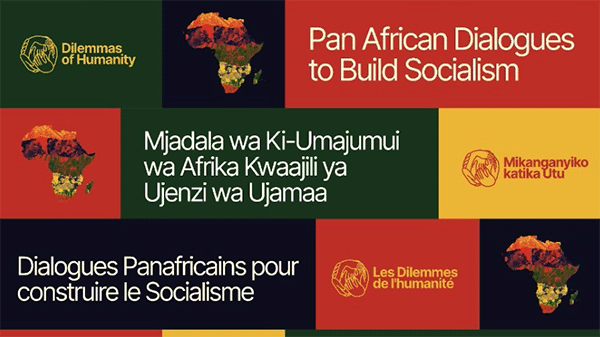On Monday, July 17, 200 delegates from progressive organizations, political parties, people’s movements, and trade unions across the African continent will gather in Bela-Bela, South Africa for the “Dilemmas of Humanity: Pan African Dialogues to Build Socialism” conference.
Over the course of four days, delegates will interact and deliberate on the myriad challenges that capitalism poses for working class people today, and importantly, advance concrete proposals of action to build socialism “within our lifetime.”
Hosted by Pan Africanism Today (PAT), the conference will bring together almost 40 organizations from 17 countries, including the National Union of Metalworkers of South Africa (NUMSA), the Socialist Movement of Ghana (SMG), the Socialist Party (SP) of Zambia, the Workers’ Democratic Way party from Morocco, as well as social and peasant movements including Abahlali baseMjondolo (AbM) from South Africa and Mtandao wa Vikundi vya Wakulima (MVIWATA) from Tanzania.
The event is being held at a critical juncture. “The world is changing, and it is changing very fast, the exploitation of the working class has deepened, [and] imperialism is getting more belligerent,” Kwesi Pratt Junior, the General Secretary of the SMG, told Peoples Dispatch ahead of the conference.
Though the “instruments of war are being sharpened, so is the resistance to imperialism and capitalism,” he stressed.
It is important for progressive anti-imperialist forces around the world to meet and strategize, to think through these changes, and to develop a means of solidarity and a means of activating our struggles until final victory.
This was also emphasized by NUMSA national spokesperson, Phakamile Hlubi-Majola,
This is a crucial conference given that, geopolitically, there is a conversation around the creation of a “new international world order,” a framework where we do not have the dominance of one entity—the U.S. There are discussions about the possibilities of a multipolar world, where the Global South will play a much more prominent role.
In this context, “it is very important for the working class to come together with a very clear framework, and clear demands about what we want from these discussions. We are tired of being used to rubber-stamp policies that leave us worse off. There has been a dominance of neoliberalism in South Africa, it is destroying us… If there are going to be conversations about us [the Global South] playing a greater role in a multipolar world, then we [the working class] should not be left behind. Our demands should take center stage,” she added Socialist Party of Zambia
The conference is part of the Dilemmas of Humanity process which is aimed at the “transformation of society and revolutionary change.” It is one of several regional conferences ahead of the III International Dilemmas of Humanity Conference in Johannesburg, South Africa in October.
The regional conferences, including the one being convened in Bela-Bela, have created a space for “movement leaders from all over the African continent to gather for the first time in many years to articulate our vision and path to socialism,” Jonis Ghedi-Alasow from the Pan Africanism Today (PAT) Secretariat, told Peoples Dispatch.
The movements and organizations represented at the conference have been at the frontlines of the struggle against capitalist and imperialist exploitation in all its forms—be it in the struggle for land, for the dignity of the working class in the face of poverty wages and neoliberal austerity, or the fight for self-determination and sovereignty.
These struggles have in turn informed the eight central themes of the conference–building socialism through food sovereignty, agroecology, and the defense of nature; Demands for health, science, and technology as a matter of dignity; Gender struggles to end patriarchy; Organizing the workers: employed, unemployed, organized and unorganized; Building the future of our youth through quality education for liberation; Urban struggles for dignified housing; Battle of ideas: art, culture, media, and communications; and Sovereignty and self-determination: security, militarization, and national liberation.
“For us, in the PAT Secretariat, we are confident that this conference will emerge with new momentum for a revolutionary Pan-Africanism, built on the struggles and victories of the African continent’s working people,” Ghedi-Alasow said.
Crucially, while delegates may hail from diverse social, political, and economic conditions and struggles, the spirit of solidarity and unity will guide the forthcoming discussions in the conference. As Pratt affirmed,
the struggle against imperialism is one [united] struggle, it is not [solely] a trade union struggle, or a struggle around issues of gender, it is a peoples’ struggle against exploitation and oppression.

